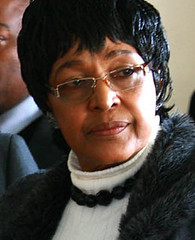
Winnie Madikezela-Mandela is a candidate for parliament in the Republic of South Africa in the upcoming elections on April 22, 2009. She is running on the African National Congress ticket.
Originally uploaded by Pan-African News Wire File Photos
GEOFFREY YORK
From Wednesday's Globe and Mail
April 1, 2009 at 4:03 AM EDT
JOHANNESBURG — At the opening of the newly renovated Mandela Family Museum in Soweto, Nelson Mandela's former wife swept up to the entrance in a black Mercedes-Benz, as coolly confident as ever.
Winnie Madikizela-Mandela, looking younger than her 72 years, made no public speech as she surveyed the bullet-scarred walls of the house where she once lived with the hero of the anti-apartheid struggle. But she didn't need to remind anyone that her political comeback is nearly complete.
Ms. Madikizela-Mandela has shrugged off the notoriety of her convictions for kidnapping and fraud. She knows that millions of supporters still see her as "the mother of the nation," not the woman who endorsed the gruesome punishment of "necklacing" (in which a tire is placed around the victim's neck, filled with gasoline and set alight), who was found by an inquiry to be involved in attempted murder, and who was banned from entering Canada because of her criminal record.
Now Ms. Madikizela-Mandela is again among the leaders of South Africa's ruling party, the African National Congress. The ANC has anointed her one of its top five candidates in this month's election - virtually guaranteeing her the ultimate vindication of electoral victory, and even a seat in cabinet if she wants it.
Among the millions of poor and working-class voters who remember the struggle for liberation from apartheid, Ms. Madikizela-Mandela is still a beloved figure and a political asset. In an ANC campaign commercial, she is shown holding Nelson Mandela's hand as he walked out of prison in 1990.
It is almost enough to justify her boastful prediction of a year ago, when she declared to a local newspaper: "I am going to return the ANC to its former glory by 2009. Watch me."
But even in her moment of triumph, Ms. Madikizela-Mandela remains dogged by controversy. Two political parties have challenged her nomination, charging she is disqualified from running because of her fraud conviction.
The challenge was rejected by South Africa's election commission last week. One of the parties, the Freedom Front Plus, took the matter to the next level of appeal, the Electoral Court, where it was rejected again yesterday.
On the face of it, the legal challenge seemed strong. The South African Constitution states that a candidate is disqualified if convicted of a crime punishable by a prison sentence of 12 months or more. The disqualification does not end until five years after the sentence has been completed.
Ms. Madikizela-Mandela, convicted of 43 counts of fraud for misusing ANC loans, had her sentence reduced on appeal in July of 2004 to three-and-a-half years in prison, and the sentence was suspended. But the election on April 22 will take place less than five years after the suspension.
By placing her among the top five in its candidate list, the ANC has reinforced its image as a party for which criminal records or alleged criminality are irrelevant. Its leader and presidential candidate, Jacob Zuma, is facing prosecution for corruption, although the prosecutors are reportedly on the verge of dropping the charges.
Ms. Madikizela-Mandela, the daughter of a farmer in a remote South African village, married Nelson Mandela in 1958 and raised two children during his 27 years of imprisonment. She suffered constant persecution from apartheid authorities who placed her under house arrest, restricted her movements, jailed her and threw her into solitary confinement for more than a year.
By the 1980s she was a khaki-uniformed militant and a powerful icon of the liberation movement. But her reputation was tarnished by the vigilante activities of her bodyguards, known as the Mandela United Football Club, who were involved in a series of violent incidents, including the killing of 14-year-old Stompie Seipei in 1989.
When the cases were brought to trial, Ms. Madikizela-Mandela was convicted of kidnapping and being an accessory to assault. The accessory charge was overturned on appeal, but a later inquiry by the Truth and Reconciliation Commission found that she was involved in assaults, attempted murder and kidnapping, and had been negligent in failing to prevent Stompie Seipei's murder.
Many South Africans believe she has rehabilitated herself by fighting for justice in unpopular causes in recent years. She became a social worker who fought for the rights of AIDS patients. She defended refugees from Zimbabwe and Congo who were suffering xenophobic attacks from South Africans.
At the peak of the xenophobia crisis last year, she personally gave shelter to a Congolese family, inviting the family to stay at her home after she saw their year-old baby sleeping on the damp floor of a police station.
No comments:
Post a Comment